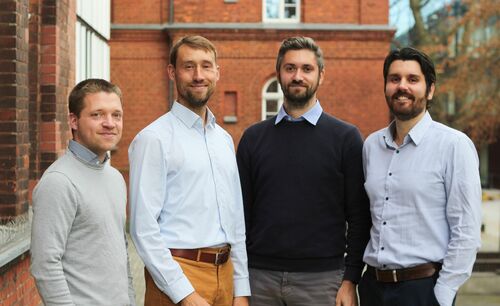Around the equator, 19 million hectares of rainforest have already been cleared for the big climate killer called palm oil. The start-up COLIPI from the Technical University of Hamburg (TUHH) has now been awarded an EXIST research transfer grant for its sustainable palm oil alternative from the laboratory. The four founders are supported by our start-up advisor Dr Andrea Otto.
The commercial clearing of the rainforest for palm oil not only releases a large amount of CO2, but also destroys important habitats of endangered animal species. However, since the vegetable oil is not only used in fuel, but according to the World Wide Fund For Nature (WWF) also in every second supermarket product, Europe still imports up to seven million tonnes of palm oil every year. The start-up COLIPI is developing a sustainable alternative that is also CO2-neutral: the production of oils with the help of yeasts.
With their technology, the founders Max Webers, Philipp Arbter, Jonas Heuer and Tyll Utesch from the Institute of Bioprocess and Biosystems Engineering at the Technical University of Hamburg want to revolutionise the cosmetics and food industry in the long term.
Fermentation – When yeast produces fat
The sustainable oil is produced by fermentation. COLIPI uses yeasts that utilise sugars from industrial and agricultural waste products, such as molasses or other biomasses, to keep their metabolism running. After nitrogen and phosphates in particular have been consumed, growth stops and lipids are formed with the remaining surplus carbon. These lipids can then be isolated and, depending on the type of yeast, are very similar to many vegetable oils. Normally, CO2 is produced during fermentation. But here, too, the team has found a climate-friendly solution: “We are developing a globally unique technology that makes the entire production process CO2-neutral. We are currently having it patented,” Philipp Arbter reports.
More sustainability in the cosmetics and food industry
The “green” oil can be used to imitate palm oil or cocoa butter, but also to develop completely new oils without a natural model. “The diversity of oils is also reflected in their application in creams, soaps or chocolates. In other words, everywhere where vegetable oils are used today,” says COLIPI project manager Max Webers.
The start-up is supported by beyourpilot’s start-up advisor Dr Andrea Otto, who was also able to assist with the application for the EXIST funding programme. The start-up is putting the necessary money from the grant into expanding oil production from laboratory scale to industrial production. The demand for the oil in commercial products is already high, he says, because awareness of greater sustainability is growing. “Products based on CO2-neutral oils give companies in the cosmetics and food industries a clear market advantage, so no one wants to jump on the bandwagon too late,” Max Webers emphasises. The first products with COLIPI’s oil are expected to be on the market in two years. On the way there, beyourpilot is there to provide advice and support.
Related links:
https://www.exist.de/EXIST/Navigation/DE/Ueber_EXIST/ueber_exist.html








